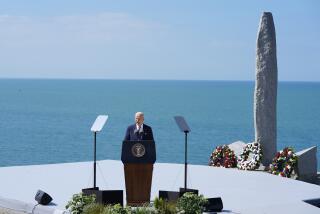PERSPECTIVES ON D-DAY : On Omaha Beach, America Bids Farewell to Europe : The Clinton generation’s energies are focused on Asia; our continental fixation recedes to the sentimental past.
- Share via
The import of President Clinton’s participation in the 50th-anniversary celebrations of D-day is that it marks America’s historical farewell to Europe. While America’s cultural mind-set will of course remain in the Western humanistic tradition born in Europe, its destiny is now more linked to Asia.
Clinton is the first American President with a post-Atlanticist imagination. Unlike any previous U.S. leader in the post-World War II era, Clinton’s formative experiences had more to do with Ho Chi Minh and Honda than Stalin or Churchill.
Clinton’s experiences as a student activist were focused on the Vietnam War; his experiences as a governor, like most American governors in the 1970s and ‘80s, were focused on the issues of jobs, education and training linked to “competitiveness” vis-a-vis the Japanese juggernaut and its Asian-tiger neighbors.
None of this is to say that Clinton will be irresponsible concerning America’s commitments in Europe, or that he lacks the proper respect for those who died on the battlefields of Europe to make the world safe for democracy. But the emotive element of Clinton’s presidency is elsewhere.
How Clinton thinks about Europe is probably very similar to the way most Americans do. That view was perhaps best, if inadvertently, expressed by former Vice President Walter Mondale, who came to Washington after Clinton was elected looking for a “serious” job. When offered an ambassadorship to Britain or France, Mondale said, “No thanks, I’ll pay for my own vacations.” He was later posted with satisfaction as ambassador to Japan.
The initiative and momentum in the Clinton Administration is all focused on Asia. The convening of Asia’s heads of state for the first time at the Asia-Pacific Economic Cooperation meeting last year is still the only major foreign-policy initiative that belongs entirely to Clinton.
No government has taken a tougher stance on the Japanese trade surplus than this Administration. Clinton has called his decision on China’s most-favored-nation status “of historic importance.” He has spent much more time agonizing over whether coddling the geriatric mandarins of Beijing for a while longer will buy enough open-market space to finally do them in than he has thought about the alternative to Boris Yeltsin in Russia or Saddam Hussein in Iraq.
Clinton’s proclivity toward Asian concerns makes sense for America; indeed it is the aspect of his foreign policy that is most cogent because it is most linked to the reconstruction of the American economy, which is what he was elected to do. It is clear that Asia, with its rapid growth rates and rising middle class, will be the world’s economic locomotive in the 21st Century.
Issues from caning to the unfair practices of communitarian capitalism in Asia will present plenty of grist for conflict across the Pacific in the coming years. Indeed, one can argue that, unlike the Atlantic Ocean, the Pacific is a vast epistemological gulf between civilizations. The world simply does not look the same from the east coast of the Pacific as it does from the west. We may squabble with the French over movie revenues, but neither side questions the Declaration of the Rights of Man. While the Lone Ranger is the mythic emblem on this side of the Pacific, the Japanese motto is “hammer down all nails” so that individualism does not disrupt the harmony of a productive community.
Even greater conflict looms. The Japanese, for example, harbor a suspicion of organ transplants enabled by the scientific definition of “brain death.” According to Shinto religious tradition, the traces of which still shape the average person’s beliefs, the spirit exists not only in the mind, but in matter and the body as well. The Japanese assumption that follows from this, “I am, therefore I think,” could not be further from the Cartesian notion upon which “brain death” (and the Western world view) is predicated--”I think, therefore I am.” Civilizational clashes don’t get much deeper than that.
All this will concentrate the strategic mind wonderfully and provide a foil for America to define its leadership role at the millennium as the last Western superpower.
America’s security role in Europe will become even fuzzier after the 50th anniversary of D-day, which has been so hyped that when it is all over a sense of closure will set in. After all, the security problem in Europe has become one that the Europeans themselves can handle, especially given the simultaneous collapse of the Soviet Union and the sustained progress that Europe has made toward unity.
By contrast, the extraordinarily impressive economic progress in East Asia, as Zbigniew Brzezinski has often pointed out, coincides with a persistent security vacuum. China, Japan, Russia and maybe even a unified Korea will emerge in the coming years as contenders for regional power. Only the United States can still provide the kind of distanced stabilizing role there that it usefully provided in Europe until the fall of the Berlin Wall.
America’s critical role is to help the Asian giant arise in a way that doesn’t threaten the liberal world order. The slumbering giant awakening in Asia today is not the peasant mass that took China down the communist path half a century ago and sapped the American spirit in the humid reaches of the Mekong Delta; it is the rising middle class that will consume and compete in the same world marketplace where Americans have set up shop.
More to Read
Sign up for Essential California
The most important California stories and recommendations in your inbox every morning.
You may occasionally receive promotional content from the Los Angeles Times.










